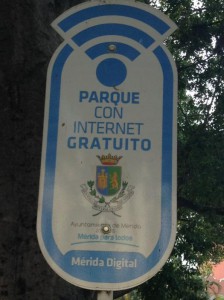
I’ve written before about how more internet access for more Cubans is likely to spur economic growth so the rollout of the internet to more parts of the country is welcome. New internet cafes have been opened – although they are still relatively expensive – and wifi is being provided in a few parks in Trinidad, Sancti Spiritus and Santiago de Cuba. I haven’t yet read any reports about how fast and secure this wifi is so if any of you have used it, please comment below. Even better, if you are reading this blog whilst actually using wifi in the park, let me know. The first one to do so (and prove it with a photo) will win a prize.
It’s also welcome that, as some media reports suggest, the government is committed to extending internet access even further with 50% of households likely to have access by 2020. That’s good news and will help Cuba catch up with some of the other countries in the region and rest of the world who are moving ahead more quickly. More than 2 billion people in developing countries are now using the internet.
Whilst access through cafés and wifi is improving, the debate about content is raging. Recently the Cuban government hosted a conference on ICT where people argued strongly about their fear of ‘cultural hegemony’. For those of you who, like me, are not well-versed in Marxist thinking, ‘cultural hegemony’ was a theory developed by the Italian Communist Antonio Gramsci (never did I dream I’d ever mention him in a blog) which describes how states use cultural institutions to maintain power in capitalist societies. I’ve only dipped into Gramsci’s work so my understanding of his thinking is not particularly deep but there appears to be a fear here that because a lot of big internet companies are based in the US, Cuban culture and Cuban thinking will be swamped and perhaps disappear.
I’m pretty sure it won’t. My experience in the last few years is that many people are fascinated by Cuba, they want to learn about its history, hear its music, see its dance. And the internet doesn’t kill things off. It allows them to grow and flourish. English may be the most widely-used language online but only about 30% of users use it – the rest don’t. They are using every other language spoken in the world including Chinese, Russian, French, Malay and, of course, Spanish (over 222 million internet users apparently).
What would Karl Marx have made of all of this? He would, I am sure, have been very much in favour of everyone having access to all that wonderful knowledge and information available on the internet. After all, he wrote his seminal work Das Kapital in the British Museum’s reading room in London, surrounded by hundreds of thousands of books. In the 1870s, that was probably the closest you could get to what the internet offers today.
